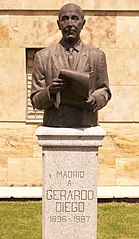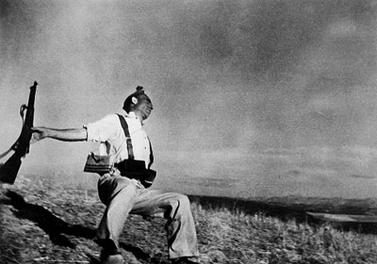Wednesday, 24 April 2024, 05:35 PM
Site: ONCE UPON A TIME IN... EUROPECourse: ONCE UPON A TIME IN... EUROPE (Our Online Reading Space)
Glossary: Glossary of terms
Generation of '27:The Generation of '27 (Spanish: Generaci?n del 27) was an influential group of poets that arose in Spanish literary circles between 1923 and 1927, essentially out of a shared desire to experience and work with avant-garde forms of art and poetry. Their first formal meeting took place in Seville in 1927 to mark the 300th anniversary of the death of the baroque poet Luis de G?ngora.  Monument to Gerardo Diego, Madrid. Writers and intellectuals celebrated an homage in the Ateneo de Sevilla, which retrospectively became the foundational act of the movement. One of the members of this group was Federico Garc?a Lorca. (source: Wikipedia) |
Federico Garc?a Lorca:Federico del Sagrado Coraz?n de Jes?s Garc?a Lorca (Spanish pronunciation: [fe?e??iko ?ar?θi.a ?lorka]; 5 June 1898 ? 19 August 1936) was a Spanish poet, dramatist and theatre director. Garc?a Lorca achieved international recognition as an emblematic member of the Generation of '27.  He was murdered by fascists forces during the Spanish Civil War. In 2008, a Spanish judge opened an investigation into Lorca's death. The Garc?a Lorca family eventually dropped objections to the excavation of a potential gravesite near Alfacar. However, no human remains were found. (source: Wikipedia) |
Spanish Civil War:The Spanish Civil War was fought from 17 July 1936 to 1 April 1939 between the Republicans, who were loyal to the established Spanish republic, and the Nationalists, a rebel group led by General Francisco Franco. The Nationalists prevailed and Franco would rule Spain for the next 36 years.  Loyalist Militiaman at the Moment of Death, Cerro Muriano, September 5, 1936, by Robert Capa. The war began after a pronunciamiento (declaration of opposition) by a group of generals of the Spanish Republican Armed Forces under the leadership of Jos? Sanjurjo against the elected government of the Second Spanish Republic, at the time under the leadership of President Manuel Aza?a. The rebel coup was supported by a number of conservative groups including the Spanish Confederation of the Autonomous Right, monarchists such as the religious conservative Carlists, and the Fascist Falange. The coup was supported by military units in Morocco, Pamplona, Burgos, Valladolid, C?diz, Cordova, and Seville. However, barracks in important cities such as Madrid, Barcelona, Valencia, Bilbao and M?laga did not join in the rebellion. Spain was thus left militarily and politically divided. The rebels, led by General Franco, then embarked upon a war of attrition against the established government for the control of the country. The rebel forces received support from Nazi Germany, the Kingdom of Italy, and neighboring Portugal, while the Soviet Union and Mexico intervened in support of the "loyalist," or Republican, side. Other countries, such as the United Kingdom and France, operated an official policy of non-intervention. Atrocities were committed by both sides in the war. Organised purges occurred in territory captured by Franco's forces to consolidate the future regime. A smaller but significant number of killings took place in areas controlled by the Republicans, normally associated with a breakdown in law and order. The extent to which killings in Republican territory were carried out with connivance of the Republican authorities varied. The Civil War became notable for the passion and political division it inspired. Tens of thousands of civilians on both sides were killed for their political or religious views, and after the War's conclusion in 1939, those associated with the losing Republicans were persecuted by the victorious Nationalists. The war ended with the victory of the Nationalists and the exile of thousands of left-leaning Spaniards, many of whom fled to refugee camps in Southern France. With the establishment of a Fascist dictatorship led by General Francisco Franco in the aftermath of the Civil War, all right-wing parties were fused into the structure of the Franco regime. (source: Wikipedia) |
1936:This was the year that Spanish Civil War started, on 17th July. |
Adela:Adela is the youngest daughter of the Bernarda Alba family in the play The House of Bernarda Alba, of the spanish writer Federico Garc?a Lorca, and the only one to defy Bernarda. She is in love with Pepe el Romano and carries on a secret rendezvous with him until her sister Martirio intervenes and they have a scuffle, drawing the attention of the sleeping household. Adela's guilt is revealed by the discovery of straw on her skirt. She then freely admits that she has been with Pepe el Romano. She hangs herself at the play's climax. (source: Wikipedia) |
Louise Michelle Rosenblatt:Louise Michelle Rosenblatt (23 August 1904 in Atlantic City, New Jersey ? 8 February 2005 in Arlington, Virginia) was an American university professor. She is best known as a researcher into the teaching of literature.  She is best known for her influential texts Literature as Exploration (1938) and "The Reader, The Text, The Poem: The Transactional Theory of the Literary Work" (1978), in which she argues that the act of reading literature involves a transaction between the reader and the text. Each "transaction" is a unique experience in which the reader and text continuously act and are acted upon by each other. A written work (often referred to as a "poem" in her writing) does not have the same meaning for everyone, as each reader brings individual background knowledge, beliefs, and context into the reading act. Additionally, she distinguished between different kinds of reading with her defined "stances". Rosenblatt placed all reading transactions on a continuum between "aesthetic" -or reading for pleasure, experiencing the poem-and "efferent" -or reading to gain meaning. Rosenblatt maintained that the act of reading was a dynamic '"transaction" between the reader and the text. She argued that the meaning of any text lay not in the work itself but in the reader's interaction with it, whether it was a play by Shakespeare or a novel by Toni Morrison. Her work made her a well-known reader-response theorist. (source: Wikipedia) |
Joyce Carol Oates:Joyce Carol Oates (born June 16, 1938) is an American author. Oates published her first book in 1963 and has since published over fifty novels, as well as many volumes of short stories, poetry, and nonfiction. Her novel them (1969) won the National Book Award, and her novels Black Water (1992), What I Lived For (1994), and Blonde (2000) were nominated for the Pulitzer Prize.  As of 2008, Oates is the Roger S. Berlind '52 Professor in the Humanities with the Program in Creative Writing at Princeton University, where she has taught since 1978. (Source: Wikipedia) |
Kingdom of the Two Sicilies:The Kingdom of the Two Sicilies (Italian: Regno delle Due Sicilie; Sicilian: Regnu d? Dui Sicili; Neapolitan: Regno d' 'e dduje Sicilie) was the largest of the Italian states before Italian unification. It was formed of a union of the Kingdom of Sicily and the Kingdom of Naples in 1816 and lasted until 1860, when it was annexed by the Kingdom of Sardinia, which became the Kingdom of Italy in 1861. The Two Sicilies had its capital in Naples and was commonly referred to in English as the "Kingdom of Naples".  The kingdom extended over the Mezzogiorno (the southern part of mainland Italy) and the island of Sicily. Lancaster notes that the integration of the Kingdom of the Two Sicilies in the Kingdom of Italy changed the status of Naples forever: "Abject poverty meant that, throughout Naples and Southern Italy, thousands decided to leave in search of a better future." Many went to the United States. It was heavily agricultural, like the other Italian states; the church owned 50?65% of the land by 1750. (source: Wikipedia) |
Ferdinand II:Ferdinand II (Ferdinando Carlo, 12 January 1810 ? 22 May 1859) was King of the Two Sicilies from 1830 until his early death in 1859.  (source: Wikipedia) |
Francis II:Francis II (Italian: Francesco II, christened Francesco d'Assisi Maria Leopoldo, 16 January 1836 ? 27 December 1894), was King of the Two Sicilies from 1859 to 1861. He was the last King of the Two Sicilies, as successive invasions by Giuseppe Garibaldi and Victor Emmanuel II of Sardinia ultimately brought an end to his rule, and marked the first major event of Italian unification. After he was deposed, the Kingdom of the Two Sicilies and the Kingdom of Sardinia were merged into the newly formed Kingdom of Italy. |